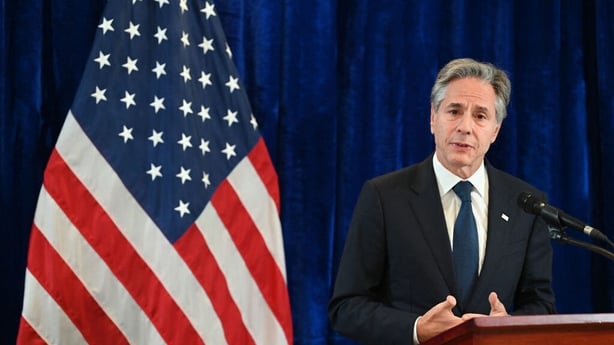Russian drones struck critical infrastructure in Ukraine's western Ternopil and Rivne regions overnight, the Ukrainian air force said.
The attack left part of the city of Ternopil without electricity, its mayor said, a week after Russia's strikes cut power to much of the city and its surrounding region.
The strikes left at least one million Ukrainians without electricity.
"Energy workers and rescuers are eliminating the consequences of the attack. Stock up on water, charge your phones," mayor Serhiy Nadal said on his Telegram messaging channel.
Ternopil lies about 220km east of NATO-member Poland.
Meanwhile, Ukraine's air force said it shot down 22 of 28 drones that Russia fired overnight.
One drone was "lost" and two more left Ukraine-controlled airspace, according to the statement.
Russia also attacked energy infrastructure in Rivne region, governor Oleksandr Koval said.
There were no casualties, he added.
We need your consent to load this rte-player contentWe use rte-player to manage extra content that can set cookies on your device and collect data about your activity. Please review their details and accept them to load the content.Manage Preferences
Air defences were also active over the Kyiv region overnight, governor Ruslan Kravchenko said with falling debris damaging four homes, two cars and a garage.
Russia's army said it captured two more villages in Ukraine
Meanwhile, Russia's army said that its forces captured two more villages in Ukraine, claiming advances along the southeastern front.
The villages of Novodarivka in the southern Zaporizhzhia region and Romanivka in the eastern Donetsk region had been seized, the military posted on Telegram.
Ukraine said that its forces had repelled a Russian effort to cross the Oskil river, which has long been a de facto front line across the east of the war-scarred country.
The waterway winds its way from Russia's western border through the northeast of Ukraine, with Russia and Ukraine's forces entrenched on either side of sections of its banks.
"As a result of the successful operation, the enemy was destroyed. The right bank of the Oskil river is under the control of the Defence Forces," the Ukrainian military said in a statement.
Ukrainian military bloggers had over recent days reported a Russian push over the river near the village of Novomlynsk in the northeastern Kharkiv region.
Russia's forces have been advancing in the Kharkiv region, which borders Russia, and are closing in on the civilian hub of Kupiansk, which is divided by the Oskil river.
Kupiansk had a pre-war population of around 27,000 people and was occupied by Russian forces just days after the Kremlin launched its invasion, when the town's mayor ceded control.
Ukraine recaptured it in September 2022 as part of a lightning offensive that saw them regain large swathes of the Kharkiv region.
NATO set to hold off Ukraine invite push
NATO foreign ministers looked set to rebuff a push from Ukraine for progress on joining their alliance ahead of Donald Trump taking power in the United States.
The incoming US president has vowed to press for a quick deal to end Russia's war - leaving Kyiv scrambling to position itself ahead of his January inauguration.
Ukraine's President Volodymyr Zelensky has said getting security guarantees from the Western alliance and supplies of key weaponry are prerequisites for Ukraine to start talking about halting its fight.
Mr Zelensky said Sunday that Ukraine was hoping NATO foreign ministers meeting in Brussels with Ukraine's top diplomat would issue "recommendations" to grant his country a membership invitation.
"But we have no illusions - there are some sceptical countries," he said.
We need your consent to load this rte-player contentWe use rte-player to manage extra content that can set cookies on your device and collect data about your activity. Please review their details and accept them to load the content.Manage Preferences
Until now, the leaders of NATO heavyweights the United States and Germany have backed away from Ukrainian membership out of fear it could drag the alliance into a war with Russia.
Diplomats said that with the administrations of US President Joe Biden and German Chancellor Olaf Scholz on their way out Ukraine hoped their foreign ministers could have more leeway.
But US officials in private say the Biden administration will not back Ukraine's push as they believe any offer would be rescinded by the president-elect.
"Such a gesture one month before the new administration will infuriate Trump, who will act contrary to this immediately," one European diplomat at NATO agreed.
State Department spokesman Matthew Miller reiterated only that "Ukraine is on the path to NATO, and NATO is on the path towards Ukraine's inclusion."
"Certainly every time we can get together as allies and talk with our Ukrainian counterparts, it's an important step along that road towards NATO membership," he said.
US to bolster Ukraine with $725m weapons package
Meanwhile, the US will send Ukraine $725 million (€690 million) of missiles, ammunition, anti-personnel mines and other weapons, Secretary of State Antony Blinken said.
The assistance will include Stinger missiles, ammunition for High Mobility Artillery Rocket Systems (HIMARS), drones and landmines, among other items, Mr Blinken said in a statement.
The Kremlin said that the US decision showed that the outgoing Biden administration was determined to throw oil on the fire of the war to ensure the conflict kept going.
Last week, Reuters reported that the Biden administration planned to provide the equipment, much of it anti-tank weapons, to ward off Russia's attacking forces.

Russia's troops have been capturing village after village in Ukraine's east, part of a drive to seize the industrial Donbas region.
"The United States and more than 50 nations stand united to ensure Ukraine has the capabilities it needs to defend itself against Russian aggression," Mr Blinken's statement said.
The announcement marks a steep uptick in size from Mr Biden's recent use of the so-called Presidential Drawdown Authority (PDA), which allows the US to draw from current weapons stocks to help allies in an emergency.

Recent PDA announcements have typically ranged from $125m to $250m. Mr Biden has an estimated $4bn to $5bn in PDA already authorised by Congress that he is expected to use for Ukraine before Mr Trump takes office on 20 January.
Trump criticised scale of Biden support
Mr Trump is widely expected to change US strategy on Ukraine, after he criticised the scale of Mr Biden's support for Ukraine and made quickly winding down the war a central campaign promise. Last week, he picked Keith Kellogg, a retired lieutenant general who presented him with a plan to end the war, to serve as special envoy for the conflict.
Mr Kellogg's plan for ending the war, which began when Russia invaded Ukraine, involves freezing the battle lines at their prevailing locations and forcing both Ukraine and Russia to the negotiating table, Reuters reported in June.
The tranche of weapons represents the first time in decades that the US has exported land mines, the use of which is controversial because of the potential harm to civilians.
Although more than 160 countries have signed a treaty banning their use, Ukraine has been asking for them since Russia launched its full-scale invasion in early 2022, and Russian forces have used them on the front lines.
The land mines that would be sent to Ukraine are "non-persistent," with a power system that lasts for just a short time, leaving the devices non-lethal. This means that - unlike older landmines - they would not threaten civilians indefinitely.

